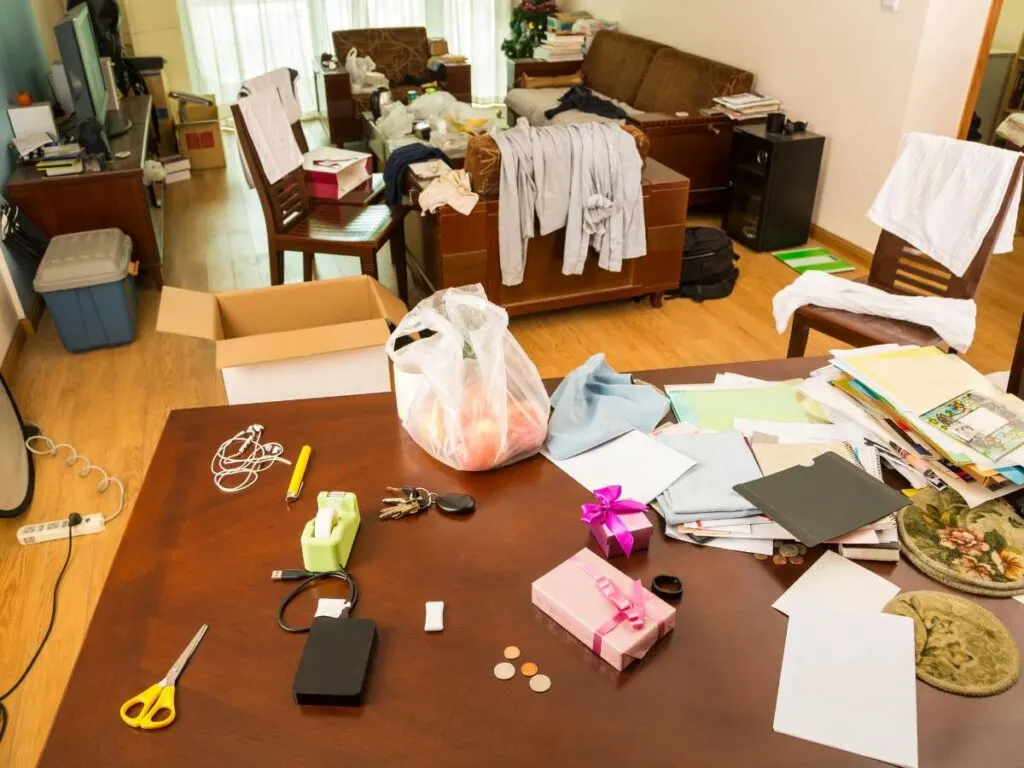Bulging closets, towering boxes, jammed drawers: who hasn’t experienced clutter in one form or another? Clutter is usually perceived as a visual eyesore, but it can also take a serious toll on your mental health. Keep reading to learn about the emotional benefits of a clutter-free home and the realistic strategies you can use to begin your decluttering journey.

The Psychological Impact of Clutter
Take a scroll through TikTok: do the homes of your favorite influencers have anything in common? Whether you’re watching home renovations or cooking videos, the houses depicted are usually spacious, sparkling clean and completely clutter-free. If you feel like this sets an impossible standard, you’re not alone. In a world obsessed with appearances, clutter is a taboo subject. It can feel shameful to have a messy, less-than-perfect home.
Feelings of guilt and embarrassment often make decluttering seem like an intimidating project. Do you want to seek support from friends and family but feel too worried about what they may think? Clutter shouldn’t be a source of humiliation, but it often is.
As your clutter builds up, your general satisfaction with life may suffer, according to a 2017 study. Professors Catherine A. Roster of the University of New Mexico and Joseph R. Ferrari of DePaul University explored how procrastination contributed to clutter. The study surveyed three adult groups and found that procrastination facilitated clutter. Clutter, in turn, was associated with a lower satisfaction with life in older adults.
Clutter doesn’t just take up needed space. It also creates negative emotions. Those negative emotions make it more difficult to implement decluttering strategies, perpetuating a vicious cycle.
The takeaway? Tackling clutter can take a lot of bravery, but a messy home isn’t a personal failure. Looking objectively at clutter may make it easier to break out of the cycle of negative emotions.
Benefits of a Clutter-Free Home
Decluttering can be difficult, especially if you have to let go of sentimental items, but the payoff is worth it. “When our living or working space is organized and clutter-free, our mind can feel more at ease,” explains Sal Raichbach, a Doctor of Psychology and Licensed Clinical Social Worker based in Palm Springs, Florida.
If you’ve ever spent ages digging in your closet in search of that one pair of jeans, then you’ll know what Raichbach is talking about. In a clutter-free home, you don’t need to waste time and energy moving around distractions. As Raichbach puts it, a tidy space “creates a sense of calm and order, allowing us to focus better and be more productive with our tasks.”
You can immediately find what you need when objects aren’t scattered everywhere. For example, a relaxing salt scrub bath is far less relaxing when your salt scrub might be hiding anywhere in the living room, medicine cabinet, nightstand or kitchen drawer.
Raichbach suggests creating designated storage spaces for items. “When everything has its designated place, we can easily find what we need and feel a sense of control over our environment.”

What Decluttering Can Do For Your Mind
The act of decluttering and a clean, clutter-free space can do so much for the mind. From reducing stress to boosting confidence and self-esteem, it can significantly improve our overall well-being and create a positive effect in various aspects of our life, starting with our mental well-being. A clutter-free home can lead to the following mental health benefits:
Boosts Mood
Imagine being tired from a busy day at work, and you have to come home to a messy and disorganized house. Would you feel excited? I know I wouldn’t! On the other hand, coming home to a clean and clutter-free house can have a positive impact on your mood instantly because you know that you’re stepping into an environment where you can relax without the added stress of clutter.
“Where you live is an extension of yourself, and it feels good to come home to a place that is tidy and organized. Even people who don’t enjoy cleaning find that if they approach it as a form of self-care instead of a chore, it can be very therapeutic,” explains Dr. Raichbach.
The act of organizing clutter and putting away things where they belong helps put the mind at ease while the body stays active. This combination leads to feelings of relief, contentment, and satisfaction, especially once you see progress. Remember, a clear space equals a clear mind!
Reduces Stress
Cluttered environments contribute to increased levels of cortisol, which is the stress hormone. This leads to feelings of stress, anxiety, and heightened symptoms of depression as you witness more clutter accumulating.
Katie Parker, a Licensed Professional Counselor from Oakland County, Michigan, wrote in her blog that living in a cluttered environment can cause stress, and vice versa – vicious cycle can be extremely hard to break out of, and continue to exacerbate leading to an even greater detrimental effect on mental health.
Parker says that therapeutic evidenced-based therapies such as Behavioral Activation can help. She wrote “Behavioral Activation is a process of setting realistic goals, establishing a structured routine, challenging negative thoughts, and seeking support. By applying these principles, decluttering becomes a manageable and empowering process.”
Decluttering and organizing can ease your mind and reduce the physiological effects of stress knowing that you’re tackling the source of your negative emotions. Removing and controlling the mess will help prevent clutter-induced overwhelm or anxiety, leaving you feeling happier, more confident, and more relaxed.
Increases Focus and Productivity
A cluttered space can overwhelm the brain with visual stimuli and can lead to cognitive overload, making it difficult to concentrate as the brain struggles to prioritize attention with all the distractions around. When you declutter your home, you are also decluttering your mind – you are removing distractions and creating an environment that allows for clearer thinking. As a result, you are able to approach tasks and challenges with greater clarity and focus.
Improves Confidence and Self-Esteem
Decluttering is no easy feat, that’s why it feels incredibly empowering to be able to clear and organize a space successfully. You’ll feel accomplished and proud of yourself after clearing a space. Taking control of your environment and creating an environment that aligns with your values and preferences can instantly boost your confidence and self-esteem, and you’ll feel ready to tackle other areas of your life.
Promotes a Sense of Mindfulness
When you’re decluttering, you are engaging in intentional and present-focused actions which promote a sense of mindfulness. Sorting through your things requires you to be attentive and focus on the present moment as you decide which items to keep, discard, or donate. You are also being mindful as you recognize attachment patterns and consciously react to the different items you are sorting.
Additionally, the act of decluttering, especially when you see progress, encourages you to appreciate the present moment, leading to a better connection with your environment and, ultimately, mindfulness.

Strategies for Managing Clutter at Home
Out of the countless decluttering strategies out there, which ones actually work? Test out these three methods to see which one best fits your lifestyle.
The KonMari Method
The queen of decluttering, professional organizer and consultant Marie Kondo, suggests asking, “Does it spark joy?” about each object in your home. An object that sparks joy should be kept around. If something no longer sparks joy, it’s time to let it go.
As Kondo’s website explains: “Joy is personal, so everyone will experience it differently.” You might feel joy sitting down to a delicious chicken dinner with your family. A beloved t-shirt might spark joy, even if it no longer fits. That uncomfortable pair of shoes, on the other hand, might not spark joy. Kondo suggests parting from items that do not spark joy with respect and gratitude.
The Four-Box Method
As you decide what to do with unneeded items, it can be helpful to use the four-box method. Gather four boxes, reusable bags or other containers. Give them each a unique label: donate, relocate, trash, and keep.
First, set apart things to donate. Thrift stores, shelters and community giveaway groups are all great options for donations. Then, consider what to relocate inside your home. For example, is your medicine cabinet crowded with too many beauty products? Consider moving the items you use once a year — looking at you, nose strips — into a drawer.
Next, what can you dispose of? Are you hanging onto magazines you won’t ever read, or a broken diffuser? Recycle junk mail, drop off broken electronics according to local guidelines and put other items in the trash. Don’t feel guilty about saying goodbye.
Finally, if an item truly sparks joy, keep it around. As you sort through the items, you’ll feel accomplished when the boxes fill up.
Don’t let that giveaway box linger too long, though. Schedule a time to donate unwanted items as soon as possible. If getting to the thrift store feels impossible, ask a friend to come along for moral support. Or, treat yourself to coffee and a pastry once you’re done.
Mini-Decluttering
Also known as resetting to zero, mini-decluttering is an excellent way to take control of clutter. It’s almost as easy as making chip dip and won’t take long. Walk through your home and address anything that seems out of place. Dirty laundry should go in the hamper, used dishes should go in the sink and any miscellaneous items should be put back in their proper places.
Mini-decluttering may initially feel like a chore. Over time, however, the visual appeal of a tidy and orderly home will become its own reward.
Embracing a New Era of Clutter-Free Living
While some degree of messiness is a normal part of human life, clutter shouldn’t stop you from enjoying your home. Understanding clutter’s dirty little secret — its negative psychological effects — is the first step to organizing a chaotic space.
A home that is crowded with unneeded items can contribute to negative feelings such as stress, anxiety and guilt. On the other hand, a clutter-free home can provide significant psychological benefits of peace and tranquility.
If you want to reclaim your home and your mind from a mess of clutter, these strategies are a great place to start. The decluttering journey doesn’t have to be intimidating. Transformation can begin with one small, single step. After all, your home isn’t for your stuff. It’s for you.
Portions of this article originally appeared on Food Drink Life.


Beatrice
Monday 29th of April 2024
I've been working at home for the last few years, like a lot of people. And this explains why I feel like I can't sit down to work at my computer unless my home is decently tidy. Now I just need to get the rest of my family on board...
Easy Homemade Life
Thursday 2nd of May 2024
I appreciate the feedback, Beatrice. I hope this will help boost your productivity. Rooting for your family to get on board too!